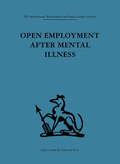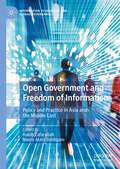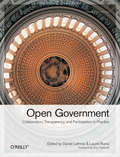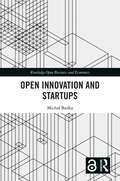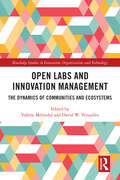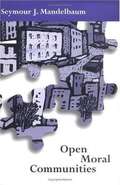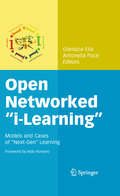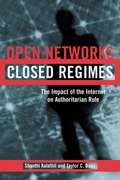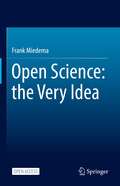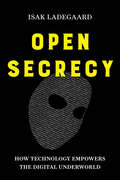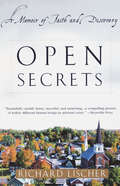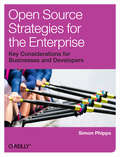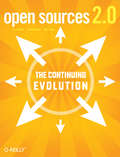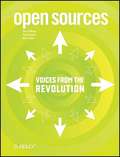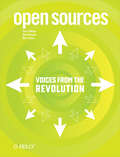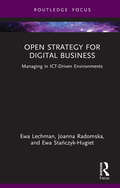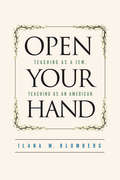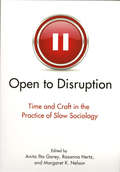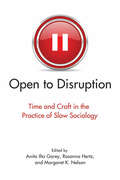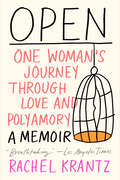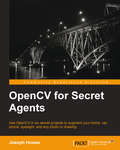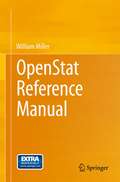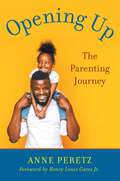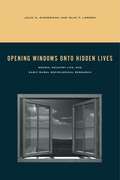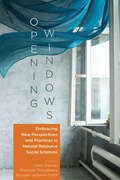- Table View
- List View
Open Employment after Mental Illness
by Nancy Wansbrough Philip CooperTavistock Press was established as a co-operative venture between the Tavistock Institute and Routledge & Kegan Paul (RKP) in the 1950s to produce a series of major contributions across the social sciences. This volume is part of a 2001 reissue of a selection of those important works which have since gone out of print, or are difficult to locate. Published by Routledge, 112 volumes in total are being brought together under the name The International Behavioural and Social Sciences Library: Classics from the Tavistock Press. Reproduced here in facsimile, this volume was originally published in 1980 and is available individually. The collection is also available in a number of themed mini-sets of between 5 and 13 volumes, or as a complete collection.
Open Government and Freedom of Information: Policy and Practice in Asia and the Middle East (Information Technology and Global Governance)
by Habib Zafarullah Noore Alam SiddiqueeThe book examines the state of Open Government in Asia. Drawing on thirteen country case studies and one regional study, it analyses the application of Freedom of Information methods and assesses their implications for democratic governance, particularly transparency, accountability, participation, collaboration, inclusive policymaking and technology. The book also considers the usefulness of open participatory platforms that enable citizens’ ‘right to information’, and help them monitor and scrutinize governmental activities to ensure accountability, integrity and the quality of democracy. Contributors to the volume evaluate Open Government and Freedom of Information arrangements and relevant issues in a particular country and adjudge their performance. The book will appeal to scholars and students of public policy, digital governance and technology.
Open Government: Collaboration, Transparency, and Participation in Practice
by Daniel Lathrop Laurel RumaIn a world where web services can make real-time data accessible to anyone, how can the government leverage this openness to improve its operations and increase citizen participation and awareness? Through a collection of essays and case studies, leading visionaries and practitioners both inside and outside of government share their ideas on how to achieve and direct this emerging world of online collaboration, transparency, and participation.Contributions and topics include:Beth Simone Noveck, U.S. Deputy Chief Technology Officer for open government, "The Single Point of Failure"Jerry Brito, senior research fellow at the Mercatus Center at George Mason University, "All Your Data Are Belong to Us: Liberating Government Data"Aaron Swartz, cofounder of reddit.com, OpenLibrary.org, and BoldProgressives.org, "When Is Transparency Useful?"Ellen S. Miller, executive director of the Sunlight Foundation, "Disrupting Washington's Golden Rule"Carl Malamud, founder of Public.Resource.Org, "By the People"Douglas Schuler, president of the Public Sphere Project, "Online Deliberation and Civic Intelligence"Howard Dierking, program manager on Microsoft's MSDN and TechNet Web platform team, "Engineering Good Government"Matthew Burton, Web entrepreneur and former intelligence analyst at the Defense Intelligence Agency, "A Peace Corps for Programmers"Gary D. Bass and Sean Moulton, OMB Watch, "Bringing the Web 2.0 Revolution to Government"Tim O'Reilly, founder and CEO of O'Reilly Media, "Defining Government 2.0: Lessons Learned from the Success of Computer Platforms"Open Government editors: Daniel Lathrop is a former investigative projects reporter with the Seattle Post Intelligencer who's covered politics in Washington state, Iowa, Florida, and Washington D.C. He's a specialist in campaign finance and "computer-assisted reporting" -- the practice of using data analysis to report the news. Laurel Ruma is the Gov 2.0 Evangelist at O'Reilly Media. She is also co-chair for the Gov 2.0 Expo.
Open Innovation and Startups (Routledge Open Business and Economics)
by Michał BańkaThis book comprehensively discusses the cooperation of corporations with startups in the context of accelerator programs. It focuses on recognizing how open innovation can catalyze startups’ development and success, and benefit corporations through access to new business models, innovative products, services and technologies developed outside the R&D departments of large organizations.The book presents a variety of collaboration models, motivations, barriers and potential for collaboration, offering readers a wealth of theoretical and practical knowledge based on the author’s research and experience in managing startup acceleration programs for multinational corporations. Readers will gain insight into the challenges and critical aspects of startup accelerator programs via a detailed analysis of open innovation theory and collaboration strategies. Based on literature and empirical research, the author offers practical guidance on how corporations should prepare and conduct acceleration activities to maximize the potential of innovation from startups and increase the chances of success.Open Innovation and Startups will appeal to scholars and researchers in the fields of innovation studies, entrepreneurship and organizational studies.The Open Access version of this book, available at www.taylorfrancis.com, has been made available under a Creative Commons Attribution-Non-Commercial-No Derivative Licence (CC-BY-NC-ND) 4.0 International license.
Open Labs and Innovation Management: The Dynamics of Communities and Ecosystems (Routledge Studies in Innovation, Organizations and Technology)
by Valérie Mérindol and David W. VersaillesThis book examines returns on experience and managerial practices to generate deeper collaboration, intensify co-creation, support start-ups and established companies to explore, develop and accelerate their projects thanks to open labs (living labs, fab labs, coworking spaces, "third spaces", etc). Open labs are the beatbox to create a rhythm in ecosystems and make all stakeholders move forward, faster, together. This book proposes a framework to understand how open labs, innovation hubs and collaborative spaces contribute to ecosystems. The book looks beyond the short-term effects of open labs and identifies four main dimensions: communities, physical spaces, events, and portfolios of services offered to private businesses, entrepreneurs, and start-ups, established companies, or public institutions. Drawing on extensive field research lasting over five years, with more than 40 cases and more than 200 interviews plus direct observation within different environments, this edited book investigates how managers run these labs, and how ‘users’ or ‘clients’ evolve when benefitting from their services. All chapters analyse how an actual management impacts the dynamics of communities, how it shapes the co-evolution between open labs and their ecosystems, and how the management of the physical space impacts the mission of the lab and its role in the ecosystem. Open Labs and Innovation Research is written for scholars and researchers within the fields of innovation studies and management science. This book can also inform teaching, public policy making, and professional practice.
Open Moral Communities
by Seymour J. MandelbaumSeymour Mandelbaum's extended reflection on communities and the myths that sustain them is a plea for a communitarian sensibility. Communities are critically important in maintaining and adapting public moral orders.
Open Networked "i-Learning"
by Antonella Poce Gianluca EliaOpen Source Applications Springer Book Series Editor: Ernesto Damiani, University of Milan, Italy http://sesar.dti.unimi.it/ossbook/ A new overall interdisciplinary framework called "i learning" integrates managerial organization and technology aspects also known as "technology enhanced learning". Open Networked "i Learning": Models and Cases of "Next-Gen" Learning begins its investigation with the important changes that have recently occurred within the management, technology and society fields. Social and cultural aspects of society that influence the "dynamics" and the "styles" of the learning processes are presented as well. The last section of this edited volume focuses on possible future scenarios of the learning processes by describing the main models, processes, tools, technologies, and involved organizations. Open Networked "i Learning": Models and Cases of "Next-Gen" Learning is suitable for advanced under- and graduate level students and professors concentrating on computer science, engineering and business management as a secondary text or reference book. Professionals and researchers who work in the related industry of technology enhanced learning will find this book useful as well.
Open Networks, Closed Regimes
by Taylor C. Boas Shanthi KalathilAs the Internet diffuses across the globe, many have come to believe that the technology poses an insurmountable threat to authoritarian rule. Grounded in the Internet's early libertarian culture and predicated on anecdotes pulled from diverse political climates, this conventional wisdom has informed the views of policymakers, business leaders, and media pundits alike. Yet few studies have sought to systematically analyze the exact ways in which Internet use may lay the basis for political change. In O pen Networks, Closed Regimes, the authors take a comprehensive look at how a broad range of societal and political actors in eight authoritarian and semi-authoritarian countries employ the Internet. Based on methodical assessment of evidence from these cases-China, Cuba, Singapore, Vietnam, Burma, the United Arab Emirates, Saudi Arabia, and Egypt-the study contends that the Internet is not necessarily a threat to authoritarian regimes.
Open Science: the Very Idea
by Frank MiedemaThis open access book provides a broad context for the understanding of current problems of science and of the different movements aiming to improve the societal impact of science and research. The author offers insights with regard to ideas, old and new, about science, and their historical origins in philosophy and sociology of science, which is of interest to a broad readership. The book shows that scientifically grounded knowledge is required and helpful in understanding intellectual and political positions in various discussions on the grand challenges of our time and how science makes impact on society. The book reveals why interventions that look good or even obvious, are often met with resistance and are hard to realize in practice. Based on a thorough analysis, as well as personal experiences in aids research, university administration and as a science observer, the author provides - while being totally open regarding science's limitations- a realistic narrative about how research is conducted, and how reliable ‘objective’ knowledge is produced. His idea of science, which draws heavily on American pragmatism, fits in with the global Open Science movement. It is argued that Open Science is a truly and historically unique movement in that it translates the analysis of the problems of science into major institutional actions of system change in order to improve academic culture and the impact of science, engaging all actors in the field of science and academia.
Open Secrecy: How Technology Empowers the Digital Underworld
by Isak LadegaardExamines how the global digital underground is liberated by "open secrecy"—a novel and ominous mix of tools for mass communication and anonymity Shadowy groups are increasingly capable of collective action. Using military-grade encryption, rerouting software, and cryptocurrencies, anonymous and pseudonymous actors can now communicate, solve problems, recruit members, and manage resources across multiple public and semipublic spaces. This swirling mix of secrecy and openness enables people to move through cyberspace like nomads with verifiable personas, which makes them impossible to stop. Isak Ladegaard takes readers inside a dark, digital economy for banned drugs that has survived numerous police crackdowns, examines how activist software developers in China and other countries have maintained paths to the open internet, and documents how the American far right uses the same tools to sustain antisocial movements based on paranoia and hate. Timely and perceptive, Open Secrecy argues that although information technology enables mass surveillance, it also undermines state power by boosting groups that evade its rule. These dual forces of control and liberation are propelling us forward, with no one at the wheel.
Open Secrets: A Memoir of Faith and Discovery
by Richard LischerOpen Secrets is Richard Lischer's story of his early career as a Lutheran minister. Fresh out of divinity school and full of enthusiasm, Lischer found himself assigned to a small conservative church in an economically depressed town in southern Illinois. This was far from what this overly enthusiastic and optimistic young man expected. The town was bleak, poor, and clearly not a step on his path to a brilliant career.It's an awkward marriage at best, a young man with a Ph.D. in theology, full of ideas and ambitions, determined to improve his parish and bring them into the twenty-first century, and a community that is "as tightly sealed as a jar of home-canned pickles." In their own way, they welcome him and his family, even though they think he's "got bigger fish to fry." Thus begins Richard Lischer's first year as a pastor: bringing communion to the sick (but forgetting to bring the wafers); marrying two unlikely couples--a pregnant teenager and her boyfriend, and two people who can't stop fighting.Often he doesn't understand his congregation, and sometimes they don't understand him; for instance, why does his wife hire a baby-sitter and instead of leaving, put on her bathing suit, grab a stack of novels, and hide from the kids? Or why can't Pastor Lischer see how important it is for a woman with little money to buy an elaborate coffin to bury her husband in? There are also the moments of grace, when pastor and parishioner unite for a common goal: when he asks for prayers for his infant son, and can feel everyone in the congregation ministering to him; when old hurts are put aside to help a desperate young woman finish college and raise her baby; or when he helps save a woman from dying of a drug overdose.In Open Secrets Lischer tells not only his own story but also the story of New Cana and all of its inhabitants--lovable, deeply flawed, imperfect people that stick together. With his sharp eye and keen wit, Lischer perfectly captures the comedy of small town life with all of its feuds, rumors, scandals, and friendships. In the end he learns to appreciate not only the life New Cana has to offer, but also the people who have accepted him, at last, as part of themselves.
Open Source Strategies for the Enterprise
by Simon PhippsSo you're thinking of creating an open source community around your code? Here are some things you ought to know before you make your plans too firm.Community Types: There is no single "open source community." Rather, there are many groups of people gathered around many free software commons. Those gatherings are themselves of several different types; you really need to understand those differences.Payment at the Point of Value: Open source is of course free software. But the freedom you're finding brings you value varies depending on the role you play with respect to the software. "Free" doesn't mean the same to everyone.Open Core Is Bad For You: The "open core" business model is popular with VC-funded startup companies but does not deliver the core freedoms from which lasting business value for customers is derived.Transparency and Privacy: The key success factor in an open source community is the equality of all the participants. A strong community is characterized by high levels of transparency about the project coupled with strong respect for the privacy of the participants. Read why you should not impose your business model on anyone.
Open Sources 2.0: The Continuing Evolution
by Mark Stone Danese Cooper Chris DiBonaOpen Sources 2.0 is a collection of insightful and thought-provoking essays from today's technology leaders that continues painting the evolutionary picture that developed in the 1999 book Open Sources: Voices from the Revolution .These essays explore open source's impact on the software industry and reveal how open source concepts are infiltrating other areas of commerce and society. The essays appeal to a broad audience: the software developer will find thoughtful reflections on practices and methodology from leading open source developers like Jeremy Allison and Ben Laurie, while the business executive will find analyses of business strategies from the likes of Sleepycat co-founder and CEO Michael Olson and Open Source Business Conference founder Matt Asay.From China, Europe, India, and Brazil we get essays that describe the developing world's efforts to join the technology forefront and use open source to take control of its high tech destiny. For anyone with a strong interest in technology trends, these essays are a must-read.The enduring significance of open source goes well beyond high technology, however. At the heart of the new paradigm is network-enabled distributed collaboration: the growing impact of this model on all forms of online collaboration is fundamentally challenging our modern notion of community.What does the future hold? Veteran open source commentators Tim O'Reilly and Doc Searls offer their perspectives, as do leading open source scholars Steven Weber and Sonali Shah. Andrew Hessel traces the migration of open source ideas from computer technology to biotechnology, and Wikipedia co-founder Larry Sanger and Slashdot co-founder Jeff Bates provide frontline views of functioning, flourishing online collaborative communities.The power of collaboration, enabled by the internet and open source software, is changing the world in ways we can only begin to imagine.Open Sources 2.0 further develops the evolutionary picture that emerged in the original Open Sources and expounds on the transformative open source philosophy."This is a wonderful collection of thoughts and examples bygreat minds from the free software movement, and is a must have foranyone who follows free software development and project histories."--Robin Monks, Free Software MagazineThe list of contributors includeAlolita SharmaAndrew HesselBen LaurieBoon-Lock YeoBruno SouzaChris DiBonaDanese CooperDoc SearlsEugene KimGregorio RoblesIan MurdockJeff BatesJeremy AllisonJesus M. Gonzalez-BarahonaKim PoleseLarry SangerLouisa LiuMark StoneMark StoneMatthew N. AsayMichael OlsonMitchell BakerPamela JonesRobert AdkinsRuss NelsonSonali K. ShahStephen R. WalliSteven WeberSunil SaxenaTim O'ReillyWendy Seltzer
Open Sources: Voices from the Open Source Revolution
by Tim O'Reilly Larry Wall Eric S. Raymond Chris Dibona Mark Stone Sam Ockman Open Source Organization Brian Behlendorf Scott Bradner Jim Hamerly Kirk Mckusick Tom Paquin Bruce Perens Richard Stallman Michael Tiemann Linus Torvalds Paul Vixie Bob YoungThrough essays that explain how the movement works, why it succeeds, and where it is going. A powerful vision from the movement's spiritual leaders, this book reveals the mysteries of how open development builds better software and how businesses can leverage freely available software for a competitive business advantage.
Open Sources: Voices from the Open Source Revolution
by Sam Ockman Chris DiBonaFreely available source code, with contributions from thousands of programmers around the world: this is the spirit of the software revolution known as Open Source. Open Source has grabbed the computer industry's attention. Netscape has opened the source code to Mozilla; IBM supports Apache; major database vendors haved ported their products to Linux. As enterprises realize the power of the open-source development model, Open Source is becoming a viable mainstream alternative to commercial software.Now in Open Sources, leaders of Open Source come together for the first time to discuss the new vision of the software industry they have created. The essays in this volume offer insight into how the Open Source movement works, why it succeeds, and where it is going.For programmers who have labored on open-source projects, Open Sources is the new gospel: a powerful vision from the movement's spiritual leaders. For businesses integrating open-source software into their enterprise, Open Sources reveals the mysteries of how open development builds better software, and how businesses can leverage freely available software for a competitive business advantage.The contributors here have been the leaders in the open-source arena:Brian Behlendorf (Apache)Kirk McKusick (Berkeley Unix)Tim O'Reilly (Publisher, O'Reilly & Associates)Bruce Perens (Debian Project, Open Source Initiative)Tom Paquin and Jim Hamerly (mozilla.org, Netscape)Eric Raymond (Open Source Initiative)Richard Stallman (GNU, Free Software Foundation, Emacs)Michael Tiemann (Cygnus Solutions)Linus Torvalds (Linux)Paul Vixie (Bind)Larry Wall (Perl)This book explains why the majority of the Internet's servers use open- source technologies for everything from the operating system to Web serving and email. Key technology products developed with open-source software have overtaken and surpassed the commercial efforts of billion dollar companies like Microsoft and IBM to dominate software markets. Learn the inside story of what led Netscape to decide to release its source code using the open-source mode. Learn how Cygnus Solutions builds the world's best compilers by sharing the source code. Learn why venture capitalists are eagerly watching Red Hat Software, a company that gives its key product -- Linux -- away.For the first time in print, this book presents the story of the open- source phenomenon told by the people who created this movement.Open Sources will bring you into the world of free software and show you the revolution.
Open Strategy for Digital Business: Managing in ICT-Driven Environments (ISSN)
by Ewa Lechman Ewa Stańczyk-Hugiet Joanna RadomskaThis book offers the reader a novel perspective on how digital contexts and open strategy approaches – the act of opening up strategic initiatives beyond company managers to involve front-line employees, stakeholders, and entrepreneurs – are related.Going beyond the claim that digital media drives open strategy by containing a detailed analyses of the interrelations between the two, the authors examine how ICT have diffused globally and trace the emerging links between digitally driven environments and open strategizing approaches. This book also draws a general picture of how and why digital technologies create new networks. A more competitive, transparent, empowered, and inclusive environment would enhance development and encourage novel approaches to strategies implemented. Real-life exemplifications of how and why digital technologies contribute to open strategizing are also provided. Various drivers impacting the necessity to develop more relational advantage are discussed and intertwined with the description of challenges observed in the case of imposing openness.A useful resource for researchers of strategic management and information systems, as well as those looking at digital strategy and transformation.
Open Your Hand: Teaching as a Jew, Teaching as an American
by Ilana BlumbergFifteen years into a successful career as a college professor, Ilana Blumberg encounters a crisis in the classroom that sends her back to the most basic questions about education and prompts a life-changing journey that ultimately takes her from East Lansing to Tel Aviv. As she explores how civic and religious commitments shape the culture of her humanities classrooms, Blumberg argues that there is no education without ethics. When we know what sort of society we seek to build, our teaching practices follow. In vivid classroom scenes from kindergarten through middle school to the university level, Blumberg conveys the drama of intellectual discovery as she offers novice and experienced teachers a pedagogy of writing, speaking, reading, and thinking that she links clearly to the moral and personal development of her students. Writing as an observant Jew and as an American, Blumberg does not shy away from the difficult challenge of balancing identities in the twenty-first century: how to remain true to a community of origin while being a national and global citizen. As she negotiates questions of faith and citizenship in the wide range of classrooms she traverses, Blumberg reminds us that teaching - and learning - are nothing short of a moral art, and that the future of our society depends on it.
Open to Disruption: Time and Craft in the Practice of Slow Sociology
by Rosanna Hertz Anita GareyAt a time when an emphasis on productivity in higher education threatens to undermine well-crafted research, these highly reflexive essays capture the sometimes profound intellectual effects that may accompany disrupted scholarship. They reveal that over long periods of time relationships with people studied invariably change, sometimes in dramatic ways. They illustrate how world events such as 9/11 and economic cycles impact individual biographies. Some researchers describe how disruptions prompted them to expand the boundaries of their discipline and invent concepts that could more accurately describe phenomena that previously had no name and no scholarly history. Sometimes scholars themselves caused the disruption as they circled back to work they had considered "done" and allowed the possibility of rethinking earlier findings.
Open to Disruption: Time and Craft in the Practice of Slow Sociology
by Anita Ilta Garey, Rosanna Hertz, and Margaret K. NelsonAt a time when an emphasis on productivity in higher education threatens to undermine well-crafted research, these highly reflexive essays capture the sometimes profound intellectual effects that may accompany disrupted scholarship. They reveal that over long periods of time relationships with people studied invariably change, sometimes in dramatic ways. They illustrate how world events such as 9/11 and economic cycles impact individual biographies. Some researchers describe how disruptions prompted them to expand the boundaries of their discipline and invent concepts that could more accurately describe phenomena that previously had no name and no scholarly history. Sometimes scholars themselves caused the disruption as they circled back to work they had considered "done" and allowed the possibility of rethinking earlier findings.
Open: An Uncensored Memoir of Love, Liberation, and Non-Monogamy
by Rachel KrantzAn award-winning journalist chronicles her first open relationship with &“breathtaking honesty&” (Los Angeles Times) in this &“sexy, messy, necessary look at polyamory&” (The Advocate).FINALIST FOR THE LAMBDA LITERARY AWARD • ONE OF THE BEST BOOKS OF THE YEAR: PopSugar, Them When Rachel Krantz met and fell for Adam, he told her that he was looking for a committed partnership—just one that did not include monogamy. Intrigued and more than a little nervous, Krantz decided to see whether their love could coexist with the freedom to date other people. Could they strike an exquisite balance between intimacy and independence, and find a way to feel passion for each other once the honeymoon phase ended? Krantz documents her dive into polyamory, from Brooklyn sex parties to swinging and beyond, in her extraordinary debut memoir. As she attempts to write a new plot for her love story with Adam, she runs up against miscommunications, gaslighting, and ancient power dynamics, and seeks solid ground in a relationship where the rules are ever-shifting. An award-winning journalist, she interviewed scientists, psychologists, and people living and loving outside the mainstream as she searched to understand what polyamory would do to her heart, her mind, and her life. With an unflinching eye and page-turning storytelling, Open is groundbreaking in both its documentarian approach to polyamory and its explicit subject matter. From debilitating anxiety spirals to heart-opening connections with the men and women she dates, Rachel puts her whole self on the line as she attempts to redefine what a relationship is—or could be.
OpenCV for Secret Agents
by Joseph HowseThis book is for programmers who want to expand their skills by building fun, smart, and useful systems with OpenCV. The projects are ideal in helping you to think creatively about the uses of computer vision, natural user interfaces, and ubiquitous computers (in your home, car, and hand).
OpenStat Reference Manual
by William MillerThis reference manual for the OpenStat software, an open-source software developed by William Miller, covers a broad spectrum of statistical methods and techniques. A unique feature is its compatibility with many other statistical programs. OpenStat users are researchers and students in the social sciences, education, or psychology, who benefit from the hands on approach to Statistics. During and upon completion of courses in Statistics or measurement, students and future researchers need a low cost computer program available to them, and OpenStat fills this void. The software is used in Statistics courses around the world with over 50,000 downloads per year. The manual covers all functions of the OpenStat software, including measurement, ANOVAS, regression analyses, simulations, product-moment and partial correlations, and logistic regression. The manual is an important learning tool that explains the Statistics behind the many analyses possible with the program and demonstrates these analyses.
Opening Up: The Parenting Journey
by Anne PeretzIncluding a foreword by Henry Louis Gates Jr., Opening Up is a chronicle of the struggles and triumphs of families suffering the internalized stresses from poverty, domestic abuse, racism, and neighborhood violence, among other challenges. Through Parenting Journey these families resolve harmful habits and identify their strengths to raise their children in a healthier environment. Anne Peretz tells the story of this bold organization and flagship therapeutic group program that takes a different approach to helping families in need. Told through the perspectives of the families who have participated over the decades, Opening Up challenges readers to think differently about family. These stories view symptoms of stress, fear, and hopelessness that extend throughout generations as remediable and how even the severely traumatized can regain stability. This book is a testament that with mutual respect, compassion, and openness, together we can address the personal and systemic injustices that are at the roots of many of these patterns and together we can rebuild these communities.
Opening Windows onto Hidden Lives: Women, Country Life, and Early Rural Sociological Research (Rural Studies)
by Olaf F. Larson Julie N. ZimmermanBuilding on their analysis in Sociology in Government (Penn State, 2003), Julie Zimmerman and Olaf Larson again join forces across the generations to explore the unexpected inclusion of rural and farm women in the research conducted by the USDA’s Division of Farm Population and Rural Life. Existing from 1919 to 1953, the Division was the first, and for a time the only, unit of the federal government devoted to sociological research. The authors explore how these early rural sociologists found the conceptual space to include women in their analyses of farm living, rural community social organization, and the agricultural labor force.
Opening Windows: Embracing New Perspectives and Practices in Natural Resource Social Sciences (Society and Natural Resources Book Series)
by Daniel R. Williams Christine Knott Rachel Kelly Grace Wang William Stewart Anna Haines John Schelhas Yan Chen Robert Emmet Jones E. Carina H. Keskitalo Sarah Hitchner John R. Parkins Robert Berry Paul Hebinck Andrea Rawluk Simon West Douglas Jackson-Smith Jaye Mejía-Duwan Michaela Hoffelmeyer Angie Carter Gabrielle Roesch-McNally Jasmine K. Brown Michael Dockry Sarah Naiman Evan J. Andrews Solange Nadeau Courtenay Parlee Archi Rastogi Maria Andrée Lópex Gómez Madu Galappaththi Ana Carolina Esteves Dias Richard Dimba Kiaka Rodgers Lubilo Prativa Sapkota Rebecca M. Ford Maddison Miller Kathryn J. H. Williams Christopher Jadallah Eliza Oldach Abraham Miller-Rushing Caitlin Hafferty Ian Babelon Beth Brockett James Hoggett Bryanne Lamoureux Melanie Zurba Durdana Islam Kate Sherren Tobin N. Walton Wiebren Johannes Boonstra Sasha Quahe Jessica Cockburn Nosiseko Mtati Vanessa Masterson Gladman Thondhlana Brett Alan Miller Polly NguyenThe third decennial review from the International Association for Society and Natural Resources, Opening Windowssimultaneously examines the breadth and societal relevance of Society and Natural Resources (SNR) knowledge, explores emergent issues and new directions in SNR scholarship, and captures the increasing diversity of SNR research. Authors from various backgrounds—career stage, gender and sexuality, race/ethnicity, and global region—provide a fresh, nuanced, and critical look at the field from both researchers’ and practitioners’ perspectives. This reflexive book is organized around four key themes: diversity and justice, governance and power, engagement and elicitation, and relationships and place. This is not a complacent volume—chapters point to gaps in conventional scholarship and to how much work remains to be done. Power is a central focus, including the role of cultural and economic power in “participatory” approaches to natural resource management and the biases encoded into the very concepts that guide scholarly and practical work. The chapters include robust literature syntheses, conceptual models, and case studies that provide examples of best practices and recommend research directions to improve and transform natural resource social sciences. An unmistakable spirit of hope is exemplified by findings suggesting positive roles for research in the progress ahead. Bringing fresh perspectives on the assumptions and interests that underlie and entangle scholarship on natural resource decisionmaking and the justness of its outcomes, Opening Windows is significant for scholars, students, natural resource practitioners, managers and decision makers, and policy makers.
